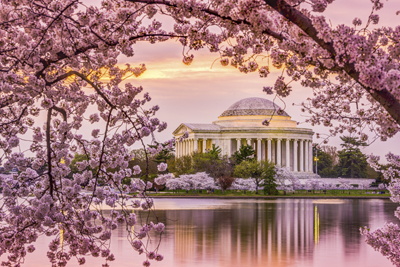
My wife Roxane, my son Craig and I visited Washington, DC over Memorial Day weekend. We enjoyed seeing the sites and experiencing the ambiance of the city, though we missed the cherry blossoms by a month. What a pleasure to take in the National Memorial Day Parade — an awesome display of patriotism held annually along Constitution Avenue.
While touring the city and seeing so much about where we’ve come from, I couldn’t help but think about where we are heading as a country. Most of us want to see our country continue to mature. We’d like to know that our cultural norms and national policies continue to transcend the challenges we face in the world.
Speaking personally, I’d like to see American principles continue to govern how we act as a country and as individuals. For more than 200 years, we’ve stood for freedom and opportunity. Do we still represent those ideals?
‘The progress of the human mind’
A special thing to do while in Washington is to visit the memorials to those who have shaped our country’s thinking. As my family and I visited these national treasures, I was struck by the words chiseled upon them.
Martin Luther King said, as preserved in stone at his memorial:
“Darkness cannot drive out darkness, only light can do that. Hate cannot drive out hate, only love can do that.”
Franklin Delano Roosevelt said many profound things. One stand-out quote for me at the FDR Memorial is:
“The test of our progress is not whether we add more to the abundance of those who have much; it is whether we provide enough for those who have too little.”
Thomas Jefferson, one of the authors of the Declaration of Independence, recognized that the newness of something can be perceived as a threat rather than as an opportunity. His thoughts on this appear on the Southeast portico of the Jefferson Memorial:
“I am not an advocate for frequent changes in laws and constitutions. But laws and institutions must go hand in hand with the progress of the human mind.”
Note that Jefferson did not advocate turning things upside down overnight. He was practical and pragmatic in saying that humankind is on a journey:
“As that becomes more developed, more enlightened, as new discoveries are made, new truths discovered and manners and opinions change with the change of circumstances, institutions must advance also, and keep pace with the times. We might as well require a man to wear still the coat which fitted him when a boy, as a civilized society to remain ever under the regimen of their barbarous ancestors.”
Convictions can change as civilization marches forward. Jefferson says this is good — so long as the changes are enlightened.
‘Provide enough for those who have too little’
There is so much talk in America today about marginalizing people in our society who are on the wrong side of the economic tracks. Some policies do indeed help those at the top end of the economic spectrum and hurt those at the bottom. But, FDR said that we should “provide enough for those who have too little.” Are we doing that as a nation? I wonder.
Today, people in powerful places advocate policies that would in fact add more to the abundance of those who already have much — and little, if anything, to those who have too little. Some want to segment groups of citizens based on their race, their religion, their sexual orientation or their background.
Standing at these wonderful memorials to great Americans, it struck me that we don’t build monuments to those who seek to marginalize people in our society. We don’t honor those who play on our fears. We don’t revere those who advocate solely for the top tier of our citizenry.
We build monuments to men and women who lead us to be inclusive, to move past whatever fears live inside us and to have empathy for those living with less.
Do you see my point?
If you do, then please visit our capital city as soon as you have occasion. You’ll feel a renewed sense of awe and of pride. More importantly, you’ll be reminded to think in an enlightened and progressive way.
If you find yourself intrigued by those who want to build walls between communities and leave groups divided, then by all means you too should visit Washington, DC. Get a fresh take on the thinking of our nation’s great leaders. Reframe your perspective on how fortunate we all are to live in this country.
“We must scrupulously guard the civil rights and civil liberties of all our citizens, whatever their background,” FDR said. “We must remember that any oppression, any injustice, any hatred, is a wedge designed to attack our civilization.”

